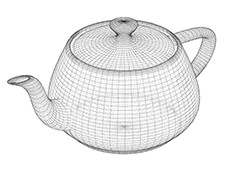Wireframe
A wireframe is a three-dimensional model that only includes vertices and lines. It does not contain surfaces, textures, or lighting like a 3D mesh. Instead, a wireframe model is a 3D image comprised of only "wires" that represent three-dimensional shapes.
Wireframes provide the most basic representation of a three-dimensional scene or object. They are often used as the starting point in 3D modeling since they create a "frame" for 3D structures. For example, a 3D graphic designer can create a model from scratch by simply defining points (vertices) and connecting them with lines (paths). Once the shape is created, surfaces or textures can be added to make the model appear more realistic.
The lines within a wireframe connect to create polygons, such as triangles and rectangles, that together represent three-dimensional shapes. The result may be as simple as a cube or as complex as a three-dimensional scene with people and objects. The number of polygons within a wireframe is typically a good indicator of how detailed the 3D model is.
3D Rendering
Since wireframes only contain vertices and lines, they can be rendered very quickly. Therefore, a complex 3D image or animation might be reduced to a wireframe model so it can be rendered and edited in real-time. While wireframe representations of 3D animations were commonly used in early 3D design, today's GPUs are so fast, they can often render fully shaded surfaces and textures in real-time with little to no lag.
NOTE: A "wireframe" may also refer to a mockup or prototype of a website layout or app design.
 Test Your Knowledge
Test Your Knowledge
